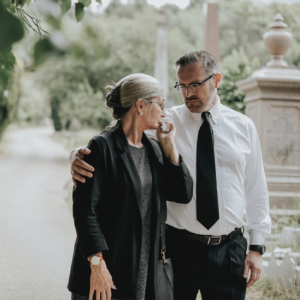The End Of Days: Ceremonies And Costs At Life’s End

The End Of Days: Ceremonies And Costs At Life’s End
October 11, 2023
While death is universal, how one’s life draws to a close and is commemorated is often very individualistic. Some refuse to plan or consider what should happen while others hope to script their funeral down to the music played, the images shown and the speakers selected to give eulogies. And some of us have jumped on the “living funeral” bandwagon, whereby friends and family come together in one last gathering to “celebrate” the life of an individual who is likely on the cusp of dying but is well enough to attend and participate in the gathering. With roots in both Japanese culture and Native American traditions, these living funerals allow an individual to participate in what can be a deeply meaningful ritual for all who are there. It’s an opportunity to celebrate rather than mourn, and to share meaningful goodbyes and deeply felt emotions. While not all may be comfortable with the idea, it does seem to be gaining some currency, especially among younger generations. You can find out more here.
Of course, a “living funeral” is not intended to replace the ritual of a more traditional funeral, which is held to allow survivors to mourn and come together in solace. While some forgo a traditional funeral, for survivors it allows emotional closure, bonding, and even the physical intimacy of a touch or hug. But planning a funeral can be difficult for survivors, caught up in grief yet also busy with such tasks as finding a funeral home, choosing a casket, getting notices out to loved ones, determining what kind of service makes sense and even arranging for such items as flowers, food and transportation. For an actual guide on what to consider, grab your tissue box and click here.
Given all the details that are typically part of a funeral, it’s no wonder that cost is often a source of controversy and challenge. A recent estimate from the National Funeral Directors Association puts the average cost of a US funeral over $8000, a sum that may be out of reach for many surviving family members, especially if the cost was unplanned and unexpected. That is why many look to pre-plan their funeral to lock in costs and arrange for burial insurance before their death. Burial insurance (also known as funeral insurance or final expense life insurance) is usually a type of life insurance that covers funeral home, burial, and other end-of-life expenses. There are different types of policies depending on what you want to spend and what kind of coverage you are seeking, but generally, these policies have a limited payout and are not intended to provide extra money to potential beneficiaries. For a look at some of the more highly regarded burial insurance plans, click here.
Of course, knowing how much insurance you will need to cover the costs of your funeral depends upon learning what you will be charged for various services. Funeral home charges are regulated by the Federal Trade Commission, which requires funeral homes to give you a written itemized list and to only charge you for items actually selected. So, for example, you don’t have to buy the casket the funeral home offers (we previously noted that even Costco sells caskets) and you can reject embalming if you are having a traditional burial and don’t want to incur that cost. For more ideas on lowering your funeral costs, read here.
Consumers are somewhat at a disadvantage when it comes to funeral preparation and costs. The website Funeral Consumers Alliance provides information and resources to help you plan and yet be protected from what is in essence a business transaction. And protection is something you very well may need. There are even reports now about unsuspecting, grieving family members being scammed out of money by fraudsters posing as funeral home employees while they prey on people mentioned in obituaries. So, whether planning your own funeral and trying to limit the financial burden on your loved ones, or planning the funeral of another, being an informed consumer is absolutely necessary. You may not be able to take your money with you, but there are clearly people out there who would be happy to take your money as you plan for the end of a life.







